Sunday, November 30, 2008
Coming soon...How to take great pictures with your shitty little camera
Do you think you need to spend thousands to take great pictures?
Do you feel inadequate on holidays when you take out your teeny-weeny one only to find the bloke/women standing next to you has a bigger one?
You think I'm a genius?
Do you think I'm cool?
Answer: No! - (apart from the last 2 of course)
You wanna learn how to take great pictures?
You wanna learn what all those buttons do?
You wanna learn how to see the world thorugh a lens?
You wanna learn how to see the world, period?
You wanna learn the 'rules' of photography?
You wanna learn how to smash those rules?
Well I'll show you!
Excited? You better be. And do you know what the best bit is?
...It's totally free!
'A camera is the eye inside the head of a poet' (Orson Welles)
Saturday, November 29, 2008
Part VIII - The continuing adventures of Super-fly 3D Sonic
(By: Superfly 3D Sonic, Lonely Galaxy Guide roving reporter)
***ENTRY BEGINS...
Are you tired of the regular glut of shiny happy-go-lucky destinations?
Are you totally fed up of travelling to far-flung planets only to get there and find them soiled with dirty backpackers’ underwear?
Do you yearn for something a little different?
Are you sick of smelling back-packers underwear?
Well fret (and smell) no more! Yes salvation is at hand! There is a planet (oh yes) which even the most die-hard travel scum have not yet penetrated thus far. Yes, somewhere in the Galaxy there is a haven for the brazen.
You wanna know where it is?
Well, come closer and I'll tell you:
Far out in the unfashionable end of the western rim of the Galaxy, 80 million miles from the star Sol, lies a little un-regarded blue-green planet whose ape descended life-forms are so amazingly primitive that they still think 14 megapixel point and shoot cameras are a pretty neat idea. A planet whose inhabitants are so amazingly backward that they still think that mobile phones are the cleverest thing ever; even cleverer then the first human-ape who said:
‘Mm, I think I will climb down from this tree and er, walk on my two legs and use these stones to kill things with and er rub these sticks together and ah! Fire! I have made fire! Me! Fire! Woh!’’
A planet whose inhabitants are so full of their own self importance that they believe they have been visited by UFO’s – as if anyone would bovver!
And what is the name of this miserable planet? Earth.
Earth?! Sounds dull as dishwater don’t it? Well that’s cos it is but don’t let that put you off. Dull is the new exci-thing!
Life on planet earth
Earth is a lush verdant harvest of a planet teeming with luxuriant forests and lovely trees that grow to great heights – which humans chop down with blunt axes and shape into fancy furniture for IKEA superstores. IKEA superstores are very popular with middle class human beings because they can show off their brand new cherry-lipstick sofa to their friends
Earths' blue oceans are brimming with a razzle-dazzle of life from intelligent octopods to crustaceans from giant mammals to tropical fish – which humans catch with hooks, fry with batter and then serve with chips, tomato ketchup and a lemon on top
Its rolling fields are a-blooming with smiling daffodils and grazed by docile gentle creatures called Sheep (that wouldn’t even upset your grandmother) – which humans kill, skin, butcher, lightly grill, and then serve with mint sauce
Thus it is clear that humans constitute the dominant life-form on planet earth. But it was not always thus. In the earth year of 1836, a young hairy naturalist called Charles Darwin, from a country called Eng-Land travelled the seven seas for five whole years in a wooden ship called the Beagle. Whilst watching turtles and moping about on the Galapagos Islands a thought popped into Charles's head. He tried to get rid of the thought because he knew it would spell trouble back home but it kept nagging and pestering him. The thought just wouldn't go away no matter how hard he tried. It was a thought that no other human had ever thought of before. It was the most revolutionary thought in the history of thoughts. More revolutionary then the thought that gave us the wheel, more useful then the thought that gave us the nylon underpant.
And what was this thought?
The thought was: ‘Charles, you are descended from an ape’. Thus in those six words he had discovered something remarkable that would shake the very foundations on which Man’s superiority was built. Previously humans had always believed that they had been created by a sky God who had trusted upon them the right of dominion over planet earth and its legions.
'No. No. No!' argued young bushy-bearded Darwin. 'Your God is false and actually we are descended from Apes'.
'No. No. No!' cried the God fearing people. 'You are wrong Mr Darwin! Very mistaken you are! For we are not apes! It is you who is the ape! We are the blessed creatures of God, and the universe revolves around us! So fuck off and go and sleep with your apes in the jungle!'
This rather surprised young Darwin because he was expecting people to be pleased with what he had thought. And thus the debate has been raging ever since, with it seems, no end in sight.
If only humans could take a lesson from the inhabitants of planet Roughshod, whose entire population believes that they were created when the gay God 'Halfbent' had a brief homosexual encounter with the butch God ‘Putfromtherough’. The inhabitants of Roughshod have never questioned this benighted theory of their providence and have thus spent many a millennium living a life of peace, harmony and blissful ignorance.
Habitation on planet earth
Today, most humans are city dwelling creatures who have spurned the fresh country air for a life of grime; living side by side in cramp grumpy houses with shoddy plumbing and mildewed ceilings. Houses where you can hear your neighbour next door screaming at the cat and the couple upstairs having rigorous sex. However, if they are fortunate enough to be wealthy humans they tend to live in detached housing and spend an inordinate amount of time boasting about this to their less fortunate friends and family who live in semi-detached housing. The people living in semi-detached housing also spend an inordinate amount of time boasting to their friends and family who live in terraced housing. People living in terraced housing always look down upon those unfortunate enough to live in high rise council flats. However, all the above mentioned turn their noses up to those living in Rochdale, North England
As a result of this the people living in Rochdale are thus given to wonder why everybody is sniggering behind their backs.
ENTRY ENDS***
Thursday, November 27, 2008
Escape from Mumbai
‘Ladies and Gentlemen, please fasten your seat belts we are about to take off’
The aeroplane bumps it's way along the runway. Its four engines shoving you into the back of your seat. Nose raised. Head tilted. Landing gear tucked in. You look out of the window and see Mumbai disappear under a smear of yellow grease. Seat belt sign off. Cabin crew hand out wet-wipes. Refreshments dully served. India a distant memory. The buzzing beehive that is India, is behind you. The sickly stench of Mumbai, that reminded you of bacterial colonies in petri dishes, is behind you. The overflowing gutters mingling with visions of the poor and the indestructible pillars of refuse-heaps, are behind you. You relax. You’ve done it. You’ve escaped. In 9 hours and 35 minutes, according to the captain, you’ll be in London Heathrow. Home never seemed sweeter. Wet pavements reflecting golden street-lights never so gay. The cold drizzly November rain never more welcome.
The Airbus A320 lands safely at Heathrow. You clap your hands and cheer. Everybody looks at you and then out of the window wondering what you're cheering about. It’s been four months but it feels like a year. In those four months you’ve experienced the glut of the human condition: you've been threatened, you’ve been robbed, hassled, harangued, poked, sworn at, spat at, accosted. You've had to endure all manner of shit; bad shit, 'for fucks sake' shit, funny shit and real bona-fide shit (yes the type that comes out of your ass). You’ve used all manner of contraptions to get from A to B: trucks, buses, air con coaches without air con, rickshaws (human, cycle, spluttering diesel engine), private Jeeps, taxis, boats, canoes, aeroplanes, trains (1st, 2nd, and cattle class). You’ve dodged vicious airport and train station touts, psychotic taxi-drivers - like the fat sweaty Sikh taxi driver in Delhi hell bent on taking you somewhere where he can kill and rob you (luckily you jumped out at the nearest traffic lights and fled into the rush hour).
Every single transaction you’ve made; from a simple hair-cut to buying a train ticket they’ve tried to wheedle you of extra money. Pay extra for 'VIP tickets', pay cancellation fees, pay me baksheesh, pay me dollars, I want dollars! dollars!, I want money!. Nothing is simple. The pugnacious airport workers in
You’ve been followed by the security services. Oh yes, shadowed in coffee shops and high class restaurants. Had your bags secretly examined in hotel rooms. You’ve fallen into a sewer full of shit - luckily your camera survived but not your self esteem. You've fallen in love. Fallen out of love. You’ve been scared shit by a gang of feral children in
Sometimes it felt like a dream too. Fleeing from one fleapit to another. Always dreaming of escape to a better place. A cleaner place. A less bossier place. Only to get there and find you want to get out of there too! It’s been a grapple. A grapple in the dark. A search for a place. That place. Does it exist? Did you find it?
Yes, you did.
In
The Deosai Plains.
Everyone needs a place
They can hide, hide away
Find a space to be alone
Nobody goes there. Not many people know about it. Good. Let’s keep it that way. It’s our secret (sush ;-)
And now here you are…
You make your way to immigration. You stand in the queue for ‘UK Passport Holders’ – you look at the queue for 'Other Passport Holders'. It is huge. You smile a lopsided smile.
‘Welcome Home’ says the Sikh man in immigration. You blink at the Sikh man. For a second you wonder whether you're dreaming and that you will wake up in a fetid hotel room in Mumbai with flies swarming around your head. ‘Welcome home man!' repeats the Sikh man in a London accent. This is no dream. This is multicultural Britain. You've arrived.
You head out of the Terminal Three building carrying a rucksack, T-shirt and slippers. It’s cold outside. Your feet are freezing. You're shivering. But you don’t mind. Nothing can swipe that smile off your face.
Say it ain’t true
Say it today
When I open my eyes
Will it all go away?
Well this morning
I opened my eyes
And it’s all gone away…
P.S: In light of the terrorist attacks in Mumbai yesterday, it seems that the title of this piece is even more pertinent. As I have mentioned in an article earlier, acts of terror; especially those perpetrated in a frenzied haze of religious fanaticism, are a cancer. Such zealots have such warped ideas, their hatred is so all consuming, that there actions sully the many millions of law-abiding, gentle and humanitarian muslims. Islam is a religion of peace and understanding. I can attest for this for my parents are muslims and 'there' religion, the 'Islam' I know and am familiar with, is a million miles away from the 'Islam' that these religious nutters claim to represent. Ultimately their motives are political and to give their politics a sheen of 'respectability' or 'god given gravitas' they dress it in pseudo-religious garbs.
Monday, November 24, 2008
Current location...London!
Definition: doing nothing - The act of sitting on a sofa, at home, brain switched off, responding to external stimuli as and when they are received; talking only when being spoken to. Eating only when being fed - it is great! You should try it. Make sure it's a comfortable sofa though.
I seem to have no interest in going out. I just want to stay at home. I wonder how long I can make this last? I hope to soak like this to Christmas! It's the perfect antidote for the sensory overload of the last four months! What makes this easier is the cold, dull, damp weather outside. There is nothing more amenable to soaking, no better path to recovery from the last four months, then 'stay at home' weather. I love this weather. It provides the perfect excuse to stay at home!
I also hope to continue my little side-project; the adventures of Super-fly 3D Sonic. As you may recall Super fly is still stuck on a dull-as-dishwater planet called earth. We can't just leave him here on earth. That would be cruel. We gotta get him out!
Thursday, November 20, 2008
Does anybody care?
He wants your drink. He doesn't want money. He wants your drink.
Do you ignore him? Do you quicken your pace? Do you shoo him away?
No, you're so surprised by the request that you find yourself loosening the grip on the drink. He takes it off you and with his older brother scuttles off. You continue walking. But something is nagging you. What is nagging you? Yes, the drinks carton was almost empty when he took it off you! That bothers you. The fact that it was almost empty. So you head back hoping to find the kids and lo and behold there they are! The two of them, taking turns sipping what's left of your drink.
'You want full drink?' you ask
The little one's eyes light up and he points towards the corn vendors stall.
'You want corn?' you ask surprised
He nods his head
You have better ideas:
You take the two of them to the ice-cream parlour (everybody inside watching you as you walk in) and ask them what they want. They point at the big poster of the chocolate sundae splashed across the wall. That's what they want. The big chocolate sundae - the biggest thing on the menu! Their little sister then comes in (8 years old) clutching a little scrawny baby. You order the same for her too.
The little one, standing in front of you, watches intently as his ice-cream is prepared. He watches as it oozes into the cup. He licks his lips as the chocolate fudge is poured all over it. He takes delight in the whole transaction. This is the same kid who has probably spent many a day with his nose pressed against the glass of the ice-cream parlour, watching from outside. And today? Today he is a customer! You take delight in watching him. He even asks for the change. The cheek!
'You keep the ice-cream and I'll keep the change' you say to him.
There's queue forming behind you now. Eyes still watching you. Do you feel ashamed? Of course not. It is they who should feel ashamed. You wonder whether apart from the odd rupee if any of these heartless fuckers has ever shown any compassion? Does anybody have a heart? Does anybody care?
You leave the kids with there ice-creams. You head back to your hotel. It's time you got out of here. Tomorrow you're leaving. Tomorrow you go back home. Home sweet home. Where people care.
And have a heart.
Monday, November 17, 2008
Saturday, November 15, 2008
The demon-haunted world
What struck me most in Varanasi was the amount of time, effort, and money expended in the run-up to the festival and during it. People had come from afar to attend; many having travelled uncomfortably for days (India is not small); along bumpy roads, in stuffy buses, on crowded trains and aeroplanes. And these were the lucky ones! What about those faithful thousands who hitchhiked? Or wheedled lifts? Or walked! And one must not forget the Government Ministers! With their white Ministerial cars (with the blue flashing light on top) and their police escorts and hangers on – all bearing alms for the sacred River.
And getting to Varanasi was just the beginning. Once here there was much to do: thousands of oil lamps had to be lit, fresh garlands prepared, flowers dressed, scents mixed, ointments rubbed in, coloured spices ground, rituals in-acted, food cooked, new clothes, make-up, and then the complicated business of the ceremonies themselves: dips in the river, the puja, the prayers, and the giving of alms to the River, the priests and the untouchables. All religious festivals, I believe, regardless of whether they are Hindu, Muslim, Christian, Buddhist, create the same feelings in people. The same feeling I used to get as a child on Eid days (and still do get) : a feeling of it being a holy, auspicious and important day.
That Christmasy feeling - Eid feeling - is something we have all felt. It’s a nice feeling. It infects the young from the old. It carries on the breeze and swoops with the kites. I saw a little girl who, with the help of her mother, dipped her hands in the sacred Ganges and scooped up some water and sprinkled it reverently about her face. She was about 4 years old. But the dignity and seriousness with which she carried out this act was charming. As a child you are at your most impressionable. The feelings that religious festivals create are seeded in us when we are children. The sacredness of places – Mosques, Temples, Churches; the forbiddings of certain foods – beef or pork, all these things and many more, the emotional element associated with them are seeded when we are children. But as children we just follow our parents; that is usual, for our parents are our protectors and are always ‘right’. That emotional attachment to religion and ceremony seeded from younger days never really leaves us. It is so powerful, so entrenched, that many years later, when we are grown up and equipped with the faculties of reason, we still maintain an emotional attachment to those beliefs of childhood. If a child has been taught that pork is forbidden, then later on, when it is grown it will still have an emotional abhorrence to eating pork even if reason tells it otherwise. Similarly, a young adult will still consider the river Ganges as sacred and coming from heaven even though in geology lessons it is taught that it is just another river that flows from the mountains to the sea.
So what is my point?
We live in a world of science and technology: of mobile phones, the Internet and jet travel. Yet, nobody believes that there is anything sacred or magical in these things. Nobody believes that mobile phones or aeroplanes have a djinn or spirit in them. Everybody knows that man has created these devices using microchips and microphones and micro processors and that they were assembled in factory lines and that there is nothing 'magical' going on inside them. Yet, to a man living 400 years a go, a mobile phone would certainly appear to embody some sort of spirit or deity. It may even be seen as sacred and god like! This reminds me of a quote by Arthur C Clarke: to a primitive civilization any sufficiently advanced technology is indistinguishable from magic
So why is it that in today’s world of technology, mankind still considers it appropriate to pay homage to a river? for that is what the Ganges actually is. A river. Imagine if droves of people were to flock in pilgrimage to the Thames in London to pay homage to it; wouldn’t that seem odd? It would wouldn’t it? So why doesn’t it seem odd when people do it in the Ganges? After all it is a river just like the Thames?
Because of the following:
1) Paying homage to the Ganges is something that is seeped into us from childhood. As mentioned earlier, things we learn in childhood become embedded in us emotionally, so that as adults we continue to follow them regardless of our faculties of reason. We 'know' it is a river, but somehow it is hard to shake off that childhood indoctrination
2) People have been paying visits to the Ganges for hundreds and thousands of years. There is a long history of worship. A history passed down generations; laid down in sacred texts, in oral traditions, in folklore. Who are you to questions all this? Surely all these people in the past and present can’t be wrong?
Er, yes they can!
If there is anything that history has taught us it is that the majority are often wrong. Just because people have always believed in something. Just because hundreds and thousands of people flock to a river to cleanse their sins in it, doesn't make it anymore truer!
Ultimately, I am fascinated by religion and its associated festivals. I am intrigued by the amount of effort that goes into appeasing Gods and giving alms to rivers to bring good luck. Surely bringing good luck to you must mean somebody else must suffer bad luck in return? That's not ethical! I am astonished that religions still draw the crowds they do. That Darwin and our technological revolution have not drowned out its chants. A world that Carl Sagan called : our demon haunted world is still very much a part of us. For it is still haunted by demons, by witches, djinns, the occult, sadhus that have (purportedly) lived hundreds of years on water alone, good luck charms, and the biggest con-trick of all: prayer.
But I don't want to go around telling people the error of their ways (not that it would make a difference anyway! Nor do I feel a desire to). But as I was strolling along the Ghats of Varanasi, watching the smiles and the playings of children, my heart felt as it does on Eid - a feeling I know well. A feeling that was seeded in me when I was a child. A feeling that says: I know what a sacred day feels like. And I could see that same feeling glowing on the faces of the people and children that day. I felt that I too could hold that feeling in my heart and sit with the people knowing exactly what they were feeling. But it is at that point that the connection ends. The feeling is there but ultimately, through some process in my past, that is all there is - a feeling. You see I can’t go any further then the feeling.
To me ultimately the Ganges is a river. Just like any other. And I see people praying to a river; in the same manner people used to pray to the sun the moon and the stars. This detachment, this aloofness or arrogance (call it what you will) has allowed me to raise my consciousness to a level above. I know ‘why’ they pray to the Ganges and ‘why’ they expend so much effort, but at the same time the bitter-sweet irony is that I can also see the futility of their actions and the ultimate pointlessness of it all! What eyes I have with which to view the world! - empathy and detachment in equal measure!
And many times I think that though it is all pointless, it does give their lives a meaning and a happiness. A happiness that is genuine and I would rather they continued with there silly little rituals and strange wondrous beliefs about sacred rivers and all!
I too am in awe, but not with Gods and Goblins. They are small fry! What gets my heart beating is the feeling I get when I try to contemplate the sweeping brush of human history - from our origins in Africa to the present - from our little blue green planet to the infinite majesty of the heavens. There is plenty of awe and wonder in the world without having to invent things like Gods and djinns and sacred rivers!
Friday, November 14, 2008
Coming soon...The Ghats of Varanasi
Wednesday, November 12, 2008
The Taj Mahal
(Rabindranath Tagore)


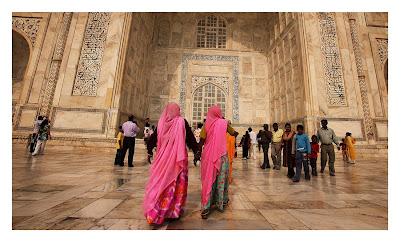





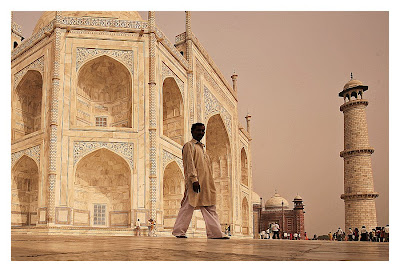









The Taj Mahal is the ultimate monument to love. So heart broken was Shah Jahan when his favourite wife Mumtaz Mahal died during giving birth to their 14th child, that he commissioned the construction of this monument to her memory. The Taj Mahal's construction commened in 1631 (the year of his wife's death) using the finest materials from all over Asia and the Empire. The translucent white marble was brought from Rajasthan, the jasper from Punjab, jade and crystal from China. The turquoise was from Tibet and the Lapis lazuli from Afghanistan, while the sapphire came from Sri Lanka and the carnelian from Arabia.
A labour force of twenty thousand workers was recruited across northern India. Sculptors from Bukhara, calligraphers from Syria and Persia, inlayers from southern India, stonecutters from Baluchistan, a specialist in building turrets, and another who only carved marble flowers. How much did it all cost? The cost of construction at the time has been estimated at 32 million rupees which; if converted to todays rates, amounts to Trillions of Dollars!
The actual Tomb of Mumtaz Mahal has the following inscriptions: 'O Noble, O Magnificent, O Majestic, O Unique, O Eternal, O Glorious... '
Who said love doesn't conquer all?
Monday, November 10, 2008
Delhi Delhicious
 The 'Qutub Minar' complex. This is the worlds tallest brick minaret (not in image above) at 72 metres and was completed in 1386. The structure even today towers over everything in Delhi. You can imagine the affect it would have had in the 14th century! It was commissioned by the first Muslim ruler of Delhi and was designed to showcase the might and awe of Islam
The 'Qutub Minar' complex. This is the worlds tallest brick minaret (not in image above) at 72 metres and was completed in 1386. The structure even today towers over everything in Delhi. You can imagine the affect it would have had in the 14th century! It was commissioned by the first Muslim ruler of Delhi and was designed to showcase the might and awe of Islam Fine filligree 'Jalee' ornamental work in the Tomb of Humayun. Notice the Islamic motifs. Islam forbids any representations of life thus the reason why much of Islamic architecture is dressed in elaborate geometric motifs
Fine filligree 'Jalee' ornamental work in the Tomb of Humayun. Notice the Islamic motifs. Islam forbids any representations of life thus the reason why much of Islamic architecture is dressed in elaborate geometric motifs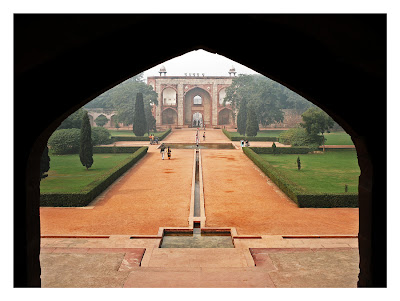
View of the Grand Gate from Humayun's Tomb. The gardens that surround the Tomb are a common component of Islamic architecture. Gardens represent paradise; what better way to accommodate a mausoleum then in man's image of heaven
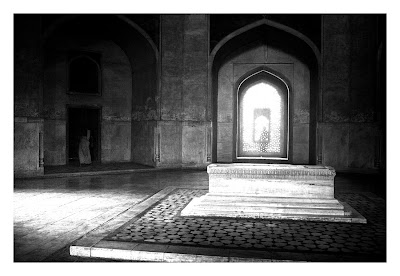 Humayun's tomb as seen from inside the main chamber. Notice the ghost hiding on the left hand side...
Humayun's tomb as seen from inside the main chamber. Notice the ghost hiding on the left hand side...
 Street life courtesy of Delhi's vibrant, crazy and chronically congested (with everything that life can throw at you) Chadni Chowk!
Street life courtesy of Delhi's vibrant, crazy and chronically congested (with everything that life can throw at you) Chadni Chowk!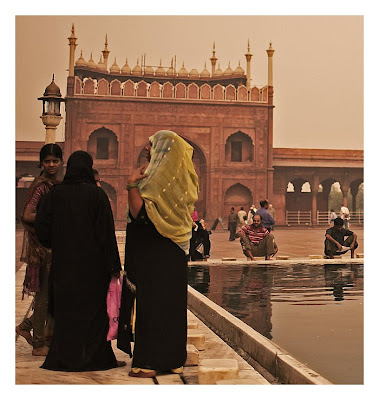 The faithful performing their 'ablution' (ritual washing) in the outside pool in preparation for prayer in the Jamia Masjid
The faithful performing their 'ablution' (ritual washing) in the outside pool in preparation for prayer in the Jamia Masjid I spotted this kid attempting to feed the cat. The family of four reside within the walls of the Jamia Masjid and live on handouts from the faithful. Mosques and Temples in India frequently contain a regular mob of alm seekers. Alms are especially free flowing on religious days!
I spotted this kid attempting to feed the cat. The family of four reside within the walls of the Jamia Masjid and live on handouts from the faithful. Mosques and Temples in India frequently contain a regular mob of alm seekers. Alms are especially free flowing on religious days!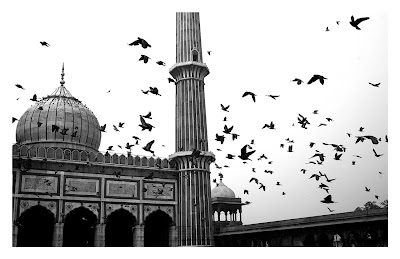 The Jamia Masjid has a large population of pigeons that live in the minarets and turrets of the mosque structure. The pigeons also receive 'alms' in the form of seeds that are thrown on the main prayer area. As a result bird shit is common but an army of busy and efficient cleaners ensure that the area is clean during prayer times!
The Jamia Masjid has a large population of pigeons that live in the minarets and turrets of the mosque structure. The pigeons also receive 'alms' in the form of seeds that are thrown on the main prayer area. As a result bird shit is common but an army of busy and efficient cleaners ensure that the area is clean during prayer times! Kids will play wherever they are regardless. Play is an integral part of growing up and these are the lucky few who at least have a chance at play - many are not so lucky and are found begging on the streets
Kids will play wherever they are regardless. Play is an integral part of growing up and these are the lucky few who at least have a chance at play - many are not so lucky and are found begging on the streets
 Rickshaws pulled by bare footed humans (Tanna Rickshaws) are banned in Delhi though they are still prevalent in Kolkata. Bicycle rickshaws are considered more ethical and are still common. The Government has considered banning these but has met opposition from the rickshaw pullers themselves; many of whom feel that they would starve if there livelihood was taken away
Rickshaws pulled by bare footed humans (Tanna Rickshaws) are banned in Delhi though they are still prevalent in Kolkata. Bicycle rickshaws are considered more ethical and are still common. The Government has considered banning these but has met opposition from the rickshaw pullers themselves; many of whom feel that they would starve if there livelihood was taken away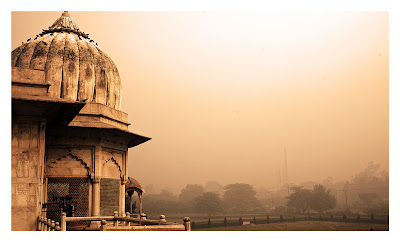 View from inside the 'Red Fort' (lal qila). This is now a carcass of it's once former glorious self. Much of it having been destroyed in the Indian Mutiny
View from inside the 'Red Fort' (lal qila). This is now a carcass of it's once former glorious self. Much of it having been destroyed in the Indian Mutiny Moghul style arches in the Red Fort. The red sandstone used to construct these and other structures was procured from Agra
Moghul style arches in the Red Fort. The red sandstone used to construct these and other structures was procured from Agra The disabled have it tough in India. Still, at least this wonderful contraption allows the owner to move about. Notice his withered right leg
The disabled have it tough in India. Still, at least this wonderful contraption allows the owner to move about. Notice his withered right leg Spice merchant in Chadni Chowk. The smells of the spice market attack the nostrils as you stroll through the mazes and narrow alleys that snake off the main bazaar
Spice merchant in Chadni Chowk. The smells of the spice market attack the nostrils as you stroll through the mazes and narrow alleys that snake off the main bazaar
Street life in Delhi. The photography in Delhi has a natural dusty look thanks to the air! There is a constant haze above Delhi that the sun barely penetrates thus imparting everything with a wonderful 'sepia' tinge. This is great for photography but not so great for the lungs!
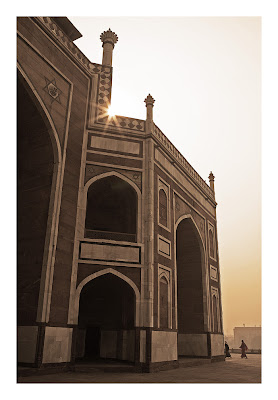 Front facade of Humayun's Tomb. Notice the human figures in the corner. I included them in the frame to give the structure a sense of scale
Front facade of Humayun's Tomb. Notice the human figures in the corner. I included them in the frame to give the structure a sense of scale
The Mughal emperor Humayans Tomb was completed in 1570. It was commissioned by his widow Hamida Banu Begum. It was the first building in the Sub-continent to incorporate Persian - Islamic styles. Later on the architecture of the mausoleum was adapted and improved to give the crowning glory of the Mughals or their Magnus Opus as you might want to call it: The Taj Mahal

















